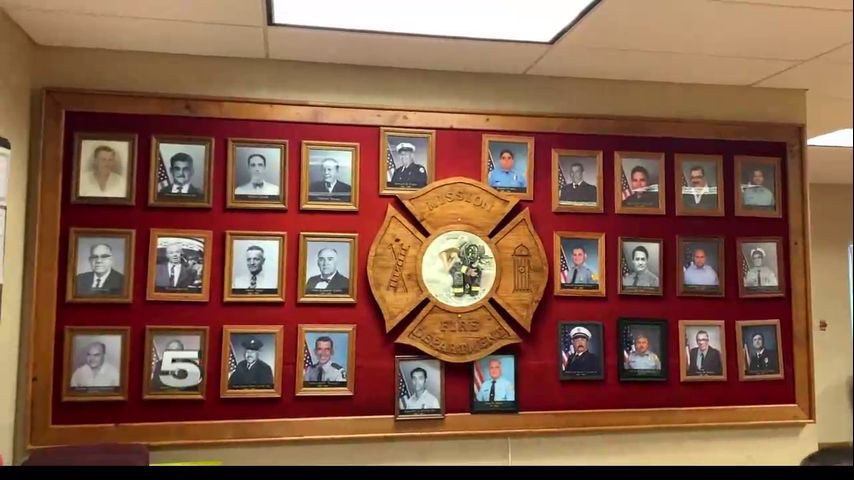Mission Firefighters: The Fight for Life
MISSION – Firefighters tasked with protecting the community were left helpless when they received a cancer diagnosis. Some lost their fight.
Others were set on a path that would change their lives and the law forever.
In just a few years, the Mission Fire Department went from one firefighter battling cancer to six.
It’s not a coincidence, but it was harder to prove than any of them could have imaged.
Days at the Mission Fire Station normally start with greeting and conversing with fellow firefighters for George Wyant and Homer Salinas. Quickly, it can change.
“It’s a whole other world when we’re in there,” said Salinas.
“You could get burned. The roof can fall on you. You can get trapped. You could get hit by a vehicle at a vehicle accident,” explained Wyant.
A brotherhood forged in fire began as a calling.
“That’s what I dreamed of since I was a kid,” said Salinas.
In 2005, the dream was interrupted. Wyant was diagnosed with cancer. He felt blindsided.
“The type of cancer I had which is Hodgkin lymphoma. At the time, there was no research into firefighters or anybody in my profession. They were never included in the studies about where it came from,” said Wyant.
The cancer effects were wide-reaching.
“My kids, our kids were young. My little one was a year old,” said Gloria Wyant, George’s wife.
“I ended up having to get one personal loan after another. I refinanced the car several times. I had to move back in with my parents,” George described.
Looking for a way to mitigate his growing debt, Wyant filed a workman’s compensation claim. It was denied. He kept going.
“We went all the way to the contestant court hearing; but at the time, you're going through chemo, you're already having the financial troubles, your body is being torn apart, not only from the cancer, but from the treatment itself and you're having to do a legal fight for something the bill had clearly stated.” George said.
The bill is known as the presumptive law and it was the problem. It didn’t list specific cancers covered by workman’s comp.
The law states in part:
“A type of cancer that may be caused by exposure to heat, smoke, radiation or a known or suspected carcinogen as determined by the International Agency for Research on Cancer.”
Self-insured cities and those who held the insurance policies could interpret that sentence however they saw fit.
From 2012 to 2018, Texas firefighters and emergency medical technicians submitted 168 cancer claims through their cities to the Texas Department of Insurance.
According to their latest annual report, 87% of those claims were denied. Wyant was no different.
“Eventually, they have more money than you, so you just give up,” said George.
Growing tired, the Wyants focused on getting better. They dropped their claim, but friends organized fundraisers to help them.
At the firehouse, cancer raised an alarm.
“He was one of the first ones in the department who got cancer. And, right after him, it’s like everyone after him went and got cancer insurance when they could the following year,” said Gloria.
They were fighting in the dark.
Years would go by before the National Institute for Occupational Safety and Health Studies exposed the dangers.
In 2013 and 2015, they released the findings. When compared to the general population, firefighters were 9% more likely to get a cancer diagnosis and 14% more likely to die of it.
Mission firefighters would see these statistics manifest in their department. Two years after Wyant’s diagnosis, cancer hit like a wave.
“Nacho, he was a firefighter with me,” Salinas said about the late Ignacio Cantu.
“Cancer is very expensive. And we weren’t prepared for that. We didn’t know the word cancer,” said Angelina Cantu, widow of Ignacio.
“Gilbert, right here. He works with me,” said Salinas while showing a picture of Gilbert Garcia.
“It kind of progressed pretty quickly. April of last year, end of April that we really found out that he had cancer and then by July 4, he had passed away. He was a really good man, good husband. ... Sorry,” said Sonia Garcia breaking into tears speaking about Gilbert, her husband.
Then in 2017, Salinas was diagnosed with renal cell carcinoma. Wyant had left a blueprint of what to do in this case.
Salinas filed a claim. When it was denied, he kept fighting. Like Wyant, the city’s insurer challenged. Salinas kept going and overcoming many challenges – and won.
It wasn’t enough. He spearheaded a change at the Capitol. Lawmakers listened. After months of fighting, they changed the law. The state now lists five specific cancers:
- • Cancer that originates at the stomach, colon, rectum, skin, prostate, testis or brain
- • Non-Hodgkin lymphoma
- • Multiple myeloma
- • Malignant melanoma
- • Renal cell carcinoma
Locally, Salinas is pursuing more changes to improve the health of his fellow firefighters.
Their equipment is getting cleaned after use, uniforms are washing immediately after every fire and certain firehouses use a hose that transfers the dirty air released from the truck into the building and funnel the air directly outside.
“Firefighters are going to be here, but we need to protect the ones who are protecting us,” said Salinas.
The changes could help those who follow.
Joe Luna is fighting Stage 3 colon cancer. He’s not alone – his family, friends and the law will be by his side.
This is not the end. Homer Salinas is still fighting for more changes.
He wants to extend the time firefighters can request workman’s comp to five years after they leave the job and a database that keeps more careful tracking of these cases statewide.





